Pedsoves formation of informational culture of students. Pedagogical Council Theme: "Formation of information culture and media competence of subjects of the educational process" - teacher, events. Preparation for pedsovetu
Information Culture and Safety among the younger generation Pedsove Target: Consider the Ways of Formation information culture and the safety of the younger generation to effectively use opportunities global Network In training and education, protection of adolescents from Internet risks and maintaining health.

Information culture and security among the younger generation Pedsovet Plan: 1. School work on the formation of head skills in the framework of GEF. - Voronina G.V. Formation of the head of junior schoolchildren in the lesson and in extracurricular activities in the framework of the GEF. - Solodovnikova M.B. Organization of work on the formation of head skills and the introduction of the basics of information security in the younger link. - Dimitrova E.V. Universal organization for information security for parents. - Birch E.N. 2. Informational safety of the younger generation. - Kozhevnikova O.S. Do not allow technologies to control themselves. - Markova TA Psychological problems of use computer technology - Volodina N.V.




In Russia, today there are about 8-10 million Internet users under the age of 14; 25% of five-year-old children use the Internet; about 6.3 million children go online from school; Two thirds of children leaving the network from home do it yourself; parental control Over the use of the baby Internet persists up to 11 years. According to the State Statistics Committee of Russia, VTsIOM, FOM, Rambler Polls, Rambler Top100




The number of Internet threats that lifting young users includes: access to unwanted content; Confidential information message to network interlocutors; Contacts with unfamiliar people through chats, Internet pagers, email, etc. Purpose of personal meetings; the threat of infection of the computer malicious software; uncontrollable purchases in online stores, etc.

Cybermatorstening. What to do in case of theft of personal data? If you suspect that your personal data are stolen, take action immediately: change passwords. Schedule the customer service department of the appropriate organizations. Schedule your bank or financial organization, if necessary, close or temporarily block your accounts. Request the report on financial transactions and check their correctness, about the discovered discrepancies, infer your financial organization. Record and save absolutely everything. After performing all actions, always make copies of documents.


Regulatory documents providing information security At school, the regulation of work on the Internet. Rules of work S. email. Rules of work on launching and updating antivirus software. Regulations on local computing network. Instructions for school staff on the procedure for monitoring the use of learning networks. Job description responsible for the use of Internet resources. Official instructions responsible for introducing content filtering system. Regulations on the school team for regulating access to information on the Internet. Information classifiers whose distribution is prohibited in accordance with the legislation of the Russian Federation.

Safety options teacher-subject: the policy of acceptable network use; Using closed learning environments, for example, where only those who received the appropriate access from the teacher leading the blog can leave their comments; Setting specific task: What do I want to find? Where? How do I use? formation of critical thinking skills; The list of resources proven by the teacher from which information is proposed; Filters and control system administrator; involving parents in school life; Security of school websites.

"In our time, we suffer from not so much due to the lack of information, how much from excess of unnecessary, useless information that does not have any attitude towards the exit from crisis situations.
Find the opportunity to separate the useless from an important
and you will feel what we own the situation. "
Jeff O`Liri.
Purpose:contribute to the formation of educators in the formation of information culture and media competence in the educational process.
Tasks:
Increase the level of competence of the participants of the educational process in the application of modern educational technologies to ensure the development of creative work of teachers through the use of active methods of academic work
Pedsove function: Generalizing-analytical, developing, motivational target.
Pedsove Technology: locally modular
Form of conducting pedsovet Seminar - workshop, work of creative groups.
Preparation for pedsovet:
- Analysis of the work of the pedagogical team of the school on the introduction of information and computer technologies into the educational process. Conducting pupils, teachers; Theoretical Justification of the issue of the Pedsovet (responsible deputy director for academic work Panfilova M. I..); Analysis of the results of the formation of informational culture of students in school Trapiznikova L. V., Detection existing problems and development of recommendations; Creating slides.
Structure of the Pedagogical Council:
I. Stage of development.
II. Stage of preparation.
III. Stage of the meeting.
Pedagogical Council:
1. Psychological attitude (1-2 min)
2. Theoretical part "Formation of information culture and media component of the subjects of the educational process" (Panfilova M. I.)
3. "Formation of information culture of schoolchildren" Speech by the librarian Trapzanikova L. in ..
4. "Formation of information culture in English lessons" Speech by the teacher of the English language Dmitruk N. and ..
5. Work in groups:
1group - "Media: for and against"
2 Group - "Interactive Board: For and Against"
3 Group - Model of a Media Competitive School Graduate
4 Group - Model of information and cultural graduate of primary school
5 Group - Model of Media Competitive Teacher
6. Protection of works of groups. Creating a poster (4-5 min each group).
7. Generalization of the results obtained, identifying problems, recommendations.
Travel of Pedagogical Council
Stage of development.
The administrative meeting defines the appointment, the purpose and task of the pedsovet and the main directions for the preparation.
The topic orients the pedagogical team to choose priority areas in the strategic, organizational, applied development of the school. The appointment of the Pedagogical Council is associated with the discussion of the formation of information culture and the media competence of the subjects of the educational process.
Stage of preparation.
- Conducting teachers. Analysis of the work of the pedagogical team of the school on the introduction of information and computer technologies into the educational process. Analysis of the results of the formation of informational culture of students in school.
Stage of the meeting.
The meeting of the Pedagogical Council is the nature of pedagogical reflection. The meeting becomes the center of collective professional thought and at the same time methodical workshop.
Speeches:
Panfilova M. I. Deputy Director for UR.
"Formation of information culture and media competence of the subjects of the educational process."
Trapseznikova L. V. Librarian of the schools "Formation of information culture of schoolchildren." Dmitruk N. I. English teacher "Formation of information culture in English lessons." Speeches of representatives of groups. Summing up the meeting of the Pedagogical Council. The adoption of the draft decision of the Pedagogical Council.
Based on the work of the pedsovet, it can be concluded that
The measures scheduled for modernization of the system are quite understandable and realized. The introduction of modern techniques and innovative technologies into the training process of modern techniques and innovative technologies. With the development of the Internet, teachers had opportunities to get acquainted with advanced education systems abroad, learn new educational technologies using distance learning, exchange views, teaching practices on various pedagogical sites.
Pedsovet solution:
- To increase information culture and media competence at every lesson, teachers emphasize attention to the formation of the concepts of "informational culture of the individual." To increase the information density and emotionality of the lesson, teachers actively implement information and educational technologies in the educational process. Teachers of primary school and language disciplines strictly monitor the execution of the program material of extracurricular reading through the reader's diary, drawings, mini-essays. Teachers who do not own a computer, pass the courses on information technology.
How to make peace, surrounding a person, has become interesting for him, important, mounted?
What conditions need to create a child, schoolboy want to touch this world, open his treasures for himself?
How to make the world of information necessary for a modern schoolboy?
How to teach him to select and choose exactly the information that will be useful to him?
In recent years, awareness of the fundamental role of information in society has occurred. Our time is called an age age. There was never at the disposal of people so much different information at the same time.
Every day, for each of us, adults, the flow of information is collapsed, the processing of which takes out more and more time, and this flow is constantly increasing. It is not easy to navigate in this truly bustling sea. It is not easy for us, adults, even more difficult to children.
What is important from this information, and what is not, how to work with it, how to evaluate? Many questions arise. And it is a school that can answer these questions, it is she who is under the power to clarify the child who is unknown in the world of information. The school is designed to teach the child to use the information so that it opens to him the world.
The little man appears on the light. It is surrounded by care and attention, help and support. He will know the world with the help of relatives and loved ones, but it's more likely to do it yourself. Parents surprise that the child increasingly rejects their help and tries to comprehend the secrets of objects and phenomena on their own.
As the informational field of the child expands, its cognitive aspirations become more active. Often, parents annoying it, they will disappear from his questions, say: grow up - you know, you know about it early, not your mind is a matter.
The child will grow up, comes to school and is waiting for, when he can know what else does not know. Baby-first-graders, holding his breath, are waiting for meetings with their teacher, who introduces them to the world of the unknown and incomprehensible information into the world of knowledge. Parents and teachers are helping to enter this world, and the educators are reported only if the teacher approaches the problem of developing cognitive activity, child interest and curiously systemically and responsibly.
However, it is possible to observe a rather sad picture: the children ask questions, waiting for an answer, and an adult who is designed to be able to find an answer to them, dismissed them, angry, does not consider it an important thing for themselves. And gradually the interest goes out, children no longer ask questions, only answer them, while doing it without a light, without zador, without joy.
➨ The problem of cognitive activity, methods, methods and techniques for the formation of the child's knowledge, its development and expansion is one of the most important problems of pedagogy. However B. lately These issues are considered one-sided, solely from the point of view of schoolchild's educational activity, urgent activities.
Happens like that: Figy-graders who studied actively in elementary school, with great pleasure and interest bring to the lessons of encyclopedia, dictionaries, trying to give the teacher to the exhaustive answer to the questions set in the textbook. And well, if the teacher not only encourages the initiative of children, but also sends it to the right direction, teaches the search for information, offers options for its search. Such a joint creative process gives its results. The guys are not only looking for information, but also learn to distinguish the main thing from the secondary.
When the teacher does not support students, their interest will be lost. Then in the 7-8th grade, when the teacher promotes to find additional material on the topic studied, the guys will not hear him.
The issues of enhancing the cognitive activity of students are often discussed in pedagogical literature. Numerous studies of P.Ya. were devoted to this topic. Galperina, N.F. Talyzina, A.K. Markova and other researchers. To a greater extent, these studies are devoted to the formation of the need and interest in knowledge during training activities. However, it is equally important to engage in the activation of the cognitive activity of the child not only in the lesson, but also in extracurricular activities.
✏ Interesting cognitive activity can not only contribute to the accumulation of knowledge, but also to develop interest and the desire to constantly recognize the new one, the habit of constantly replenishing their knowledge. The process of squeezing well organized by adults contributes to the fact that the child seeks to acquire knowledge not only with the help of an adult, but also independently.
Sometimes come across that the methods and techniques that the teacher uses in their work will be blankly beat off the child to learn something new in general. But it's no secret that the educational tasks of a cognitive nature, taking into account the age of children, their interests, hobbies, interconnected with educational interesting extracurricular work contribute to the fact that students begin to show cognitive activity in the most different types Activities.
Active formation of learning students begins in primary schoolse, continues at all stages of student schoolboy.
In the younger school age There is a process of absorption and accumulation of knowledge, the period of assimilation of these knowledge according to their preferential sign: the knowledge of interesting, unusual, form, the more in children of desire and interest they have.
At the middle stage of training The habit of producing information is formed, I constantly use it, there is a persistent need of information. It is at the average stage of training that such conditions must be created for students in order to maximize their information field, contribute to the formation of information culture.
Information culture - This is a systematic combination of knowledge, skills, skills that ensure the optimal implementation of individual information activities aimed at meeting the information needs of students arising in the course of educational, scientific and educational and other activities.
Leading role in the formation of information culture Personality is entrusted to educational institutions.
Only educational institutions in a number of other social institutions, in accordance with the existing legislation in the educational sphere, are able to provide a daily effect on each student, providing systematic work on its information training.
In a secondary school, students' information training is designed to exercise all teachers within the framework of taught training disciplines.
In practice, as the analysis shows, the skills of working with information are formed mainly during the study of three academic disciplines: Russian language, literature and informatics, as well as during the implementation of independent, research work of students: the preparation of abstracts, reports, competitive works, and T . P.
The indisputable advantages of the teacher in the informational training of students are the systematic nature of the impact on students due to regularity training activities, knowledge of the psychological and pedagogical features of each of the age groups of students, professional possession of a wide range of modern forms and methods of training, innovative pedagogical technologies.
At the same time, a highly qualified subject teacher does not always own himself owns the subject area associated with the formation of an individual information culture and includes not only a wide range of professional information Knowledge and skills, but also beliefs. This is a belief-based conviction in the inevitability of human entry into the information society and the knowledge society; and an idea of \u200b\u200bthe diversity of information resources accumulated by humanity; and ownership of information retrieval algorithms.
For all members of society, the need to continuously improve the qualifications, knowledge updates, the development of new activities increases.
The sign of the information society is the approval of the cult of knowledge.
✏ Special relevance Acquires the formation of an informational culture of the individual, in front of which extensive prospects for the effective use of information resources accumulated by humanity.
The absence of a holistic concept of the formation of an individual information culture, as well as the globality of the task of preparing the younger generation to life in the information society, give this problem with national importance. And in her solving a special place, of course, should take general educational institutions. Only a fundamental education allows a person to separate the grains from the spurred, take advantage of the information and turn it into knowledge. Obviously, the question of: what exactly is we know that we read how we choose objects for knowledge, for reading from unbarrible in-formation and documentary arrays. What a person can learn and read for their lives is negligible if the resessment is silent to use all the information that herself goes into hand, or read everything accidentally falling on his eyes. But this small can become very many if the information that the schoolboy receives is interesting, useful, affects the mind, heart and soul.
- Stage of development.
- Stage of preparation.
- Stage of the meeting.
I. Stage of development.
II. Stage of preparation.
III. Stage of the meeting.
:
5. Work in groups:
1group - "Media: for and against"
2 Group - "Interactive board: for and against"
3 Group - Model of a Media Competitive School Graduate
Travel of Pedagogical Council
Speeches:
Pedsovet solution:
View the contents of the document
"Pedagogical Council Topic:" Formation of information culture and media competence of the subjects of the educational process ""
Pedagogical Council
Subject:"Formation of information culture and media component of the subjects of the educational process"
"In our time, we suffer from not so much due to the lack of information, but from an excess of unnecessary, useless information that does not have any attitude to the exit from crisis situations.
Find the opportunity to separate the useless from an important
and you will feel that we own the situation. "
Jeff O`Liri.
Purpose:contribute to the formation of educators in the formation of information culture and media competence in the educational process.
Tasks:
Increase the level of competence of participants in the educational process in the application of modern educational technologies
Ensure the development of creative work of teachers through the use of active methods of academic work
Pedsove function: Generalizing-analytical, developing, motivational target.
Pedsove Technology: locally modular
Form of conducting pedsovet Seminar - workshop, work of creative groups.
Preparation for pedsovet:
Analysis of the work of the pedagogical team of the school on the introduction of information and computer technologies into the educational process.
Conducting pupils, teachers;
Theoretical Justification of the issue of the Pedsovet (responsible deputy director for academic work Panfilova M.I. .) ;
Analysis of the results of the formation of informational culture of students in school Trapsenikova L.V.,
identifying existing problems and development of recommendations;
creating slides.
Structure of the Pedagogical Council:
I. Stage of development.
II. Stage of preparation.
III. Stage of the meeting.
Pedagogical Council :
1. Psychological attitude (1-2 min)
2. Theoretical part "Formation of information culture and media competence of the subjects of the educational process" (Panfilova M.I.)
3. "Formation of information culture of schoolchildren" Speech by the librarian Trapzanikova L.V.
4. "Formation of information culture in English lessons" Speech by the English teacher Dmitruk N.I.
5. Work in groups:
1group - "Media: for and against"
2 Group - "Interactive board: for and against"
3 Group - Model of a Media Competitive School Graduate
4 Group - Model of information and cultural graduate of primary school
5 Group - Model of Media Competitive Teacher
6. Protection of works of groups. Creating a poster (4-5 min each group).
7. Generalization of the results obtained, identifying problems, recommendations.
Travel of Pedagogical Council
Stage of development.
The administrative meeting defines the appointment, the purpose and task of the pedsovet and the main directions for the preparation.
The topic orients the pedagogical team to choose priority areas in the strategic, organizational, applied development of the school. The appointment of the Pedagogical Council is associated with the discussion of the formation of information culture and the media competence of the subjects of the educational process.
Conducting teachers.
Analysis of the work of the pedagogical team of the school on the introduction of information and computer technologies into the educational process.
Analysis of the results of the formation of informational culture of students in school.
Stage of preparation.
Stage of the meeting.
The meeting of the Pedagogical Council is the nature of pedagogical reflection. The meeting becomes the center of collective professional thought and at the same time methodical workshop.
Speeches:
Panfilova M.I. Deputy Director for UR.
"Formation of information culture and media component of the subjects of the educational process."
Trapiznikova L.V. Librarian schools "Formation of information culture of schoolchildren."
Dmitruk N.I. English teacher "Formation of information culture in English lessons".
Speeches of representatives of groups.
Summing up the meeting of the Pedagogical Council.
The adoption of the draft decision of the Pedagogical Council.
Based on the work of the pedsovet, it can be concluded that
The measures scheduled for modernization of the system are quite understandable and realized. The introduction of modern techniques and innovative technologies into the training process of modern techniques and innovative technologies. With the development of the Internet, teachers had opportunities to get acquainted with advanced education systems abroad, learn new educational technologies using distance learning, exchange views, teaching practices on various pedagogical sites.
Pedsovet solution:
To increase information culture and media competence in every lesson, teachers emphasize attention to the formation of the concepts of "personality information culture".
To increase the information density and emotionality of the lesson, teachers actively implement information and educational technologies in the educational process.
Teachers of primary school and language disciplines strictly monitor the execution of the program material of extracurricular reading through the reader's diary, drawings, mini-essays.
Teachers who do not own a computer, pass the courses on information technology.
Sections: School administration
Very important in the work of the administration of an educational institution is to monitor the implementation of administrative decisions. Any control is not an end in itself and should not end with a simple state defation: children do not own knowledge, the teacher does not use the appropriate methodological techniques, etc. Inherent component Control - pedagogical analysis, the content of which is to determine the causes of success or failures in the implementation of the tasks set, and, rearing the reasons, you can already determine the ways to correct the shortcomings or ways to distribute interesting pedagogical finds. We present a certificate version drawn up by the results of monitoring the implementation of the decision of the Pedagogical Council.
reference
On the implementation of the decision of the pedsovet number 3 of 01/13/2010 "Formation of a schoolboy information culture"
Purpose: check the level of implementation of solutions of this pedsovet.
According to the results of the work of the pedsovet number 3 of 13.01.2010, the following work plan was formulated:
- Develop recommendations for teachers to form a schoolboy information culture.
- Conduct a series of training seminars for teachers.
- Recommend Mo to analyze the work of teachers on the use in the educational process ICT
- Recommend Mo to conduct open lessons with the use of media products, create a bank of methodical developments of teachers using ICT
- To summarize and disseminate the experience of teachers on the use of ICT on the Internet.
As a result of the analysis of the work of the school in this area, the following conclusions can be drawn:
- The formation of information and communicative competence of students takes place primarily through the teaching of computer science and ICT as a separate study subject. At the stage of primary general education and basic general education as a separate item "Informatics and ICT" in 3-8 classes (1 hour). At the step of medium total general education, the subject "Informatics and ICT" 9-11-E CL. 2 hours a week in order to prepare for the exam.
- For 10-11 classes: Conducting social training practices "Creating a school site", "Creation of electronic educational materials", as well as through educational and research activities on various subjects, through integrated development information technologies and information culture in various training subjects.
- The level of the status of the material and technical base
MOU "Checkrushanskaya School" (as of 11/20/2010)
Name of resource |
Number of units |
|
| Computer class | ||
| Media Antiatics | ||
| Server | ||
| Multimedia projector | ||
| Screen | ||
| Video camera | ||
| Teaching cabinetsequipped with media equipment | ||
| Library and Administration (PC) | ||
| The local network | ||
| Internet access 128 kbit / s: | ||
|
||
|
||
| Other: | ||
|
||
|
||
|
||
|
||
| Medialectoria | ||
| Digital camera | ||
| Graphics tablet | ||
| Web cameras | ||
| Small printing house (laser, color) | ||
| Interactive direct projection boards | ||
| LCD panel |
- Ensuring access to students and teachers to computer technician To master information technology.
- Using software.
- The teacher's lessons use the following and technologies:
The computer class has 5 students and one place teacher, printers - 2 pcs, scanner. All PCs have Internet access: Connection, maximum speed 128 kbps. In the computer class created the local network. One computer accounts for 26 students. All teachers and students have access to computer equipment according to the chart of the Cabinet.
All computers are installed licensed software From the first aid - 1 and 2.
In order to computer security in school installed antivirus software(Kaspersky), the system of regularly updated them is worked out, which made it possible to significantly reduce the number of viral attacks in the educational network.
As part of the implementation of activities to exclude access to students educational institutions Resources that are not compatible with the tasks of education and education of students have developed a necessary regulatory framework for strengthening the control over compliance with legislation and regulations on regulating access to information on the Internet.
Content-filter is installed on all computers that have access to the Internet.
- Technology of video adjustment or video tracking;
- Technology of creating an animation training fragment;
- Technology of creating an animation fragment for modeling and practical work of students;
- Programming Survey Technology and Train Self Control (Tests)
- Presentations.
With the transition to the concentric system of training in the program for some subjects, laboratory works appeared, which are not always possible to spend in the conditions of the school laboratory.
Therefore, teachers conduct interactive laboratory work on biology and chemistry. The main task of this project is to ensure the implementation of the practical part in the full curriculum. These interactive works, laboratory workshops and experiments can be used in the future, both at the lesson and during independent work students at home. I want to note that interactive laboratory work and workshops are built on the basis of the method of effective application of new pedagogical instruments, such as:
Appearance computer programs He led to the fact that part of the teachers refused to actively work in the lessons. However, it turned out very soon that such a replacement is not always desirable, the computer can only be used in the lesson as an information tool. As the observations showed - the use of multimedia disks is justified if:
- they are proposed original and valuable material material;
information is proposed that is not available in school conditions.
- Types of lessons are most commonly used by teachers:
School in lessons is used by seven use options information resource.
Combining information resource with other learning tools |
Resolved tasks |
| In the lesson, the traditional information environment - home email | |
| In the first lesson, the traditional information environment, in the next lesson, multimedia textbook or benefit | Check knowledge of students. Repetition and synthesis of knowledge. |
| In the lesson, the traditional information environment and electronic textbook or benefit | Message of students of new knowledge based on examples from biology, geography, ecology, chemistry, history, literature and others. Comparison of information presented in different forms |
| At the lesson, an electronic tutorial - home traditional information environment | Restoring in memory seen in the lesson. Development of the ability to allocate the main thing in visual information. |
| Electronic tutorial during laboratory experience or practical work | Self-control when performing a physical experiment. |
| Electronic textbook or benefit and physical experience | Message of students of new knowledge about ways of activity. Check knowledge of safety regulations |
| Only an electronic textbook or manual (with the participation of the teacher) | Development of the ability to allocate the main thing in visual information |
When organizing training activities with the application of information technologies, teachers take into account sanitary rules and norms (SanPine 2.2.2.542-96), which regulate the possibilities of applying computers in the educational process, taking into account age characteristics of students. The continuous duration of classes directly with the computer does not exceed:
- for students of the 1st grade - 10 minutes,
- for students of 2-5 grades - 15 minutes,
- for students of 6-7 grades - 20 minutes,
- for students of 8-9 grades - 25 minutes,
- for students of 10-11 classes on the first hour of training sessions for 30 minutes, on the second - 20 minutes.
- Use of ICT funds in extracurricular activities
| olympiad | TKP | competitions | Accommodation on sites |
| Online English Championship - 2 student | Network educational and creative project "Mamino Sunday "-7 learning 3rd grade | All-Russian competition "Intel-learning for the future" "1 student + 1 computer" - 2 participants (Zakharova E.I., Polyanikkin O.V.) |
All-Russian competition of creative developments of the site "Big Change" dedicated to the year of the teacher, the video "Last bell" - Nesterova M.A. |
Regional internet Olympiad. "On the pages of history" - 2 student |
Telecommunication project "Welcome to Russian school" - 8 student 6-8-CL. | participation in the telecommunications project for English teachers Omelta - Zakharova E.I. | Polyanykina O.V.-national competition of video projects "New Space of Russia", video "Expedition on the disappeared villages" |
Olympiad "Intellect. Believe in your forces 2010 " |
Network intellectual-creative project "Edge You are our Siberian, the edge you are our native!" | Competition of presentations, dedicated to the memory of political repression - Madeev Vadim 9th CL. | Ivanova S.V. -publication of the development of a pedsway "Formation of a schoolboy information culture" on the site http://www.zavuch.info/ |
| Lomonosov Olympiad in English-3 | telecommunication project "Magic thimble" (gift to the beloved teacher - 7 students. |
- The results of the diagnosis of students. (Attachment 1)
Thanks to the use of information technologies, we received:
- Brightness and clarity of the presentation of training materials.
- Interactive interaction of the information environment with each of the students.
- The figurative presentation of the material is suitable for educational and extracurricular work.
- In general, the results of work in the 2009-2010 academic year in this direction can be considered satisfactory.
- For all teachers and students are available in accordance with their needs computers and main services: print, scanning, recording on CD-R, etc.
- The total ICT literacy of employees is 86%
- ICT is used on subject lessons teachers of history (Madeeva T.Yu.), biology (Sotnikova A.V.), English (Zakharova E.I.), primary classes (Dubkova M.A.), Russian language (Yushkevich T. A.) Regularly.
- The slice of knowledge on computer science in translation classes (4, 9, 11) showed good results: the quality of execution is 72%, 100% execution.
- Recommendations have been developed for teachers for the formation of a schoolboy information culture.
- Training seminars for teachers on the topics "Using the XL program in the work of the teacher", "preparation of the presentation in Microsoft Office. POWER POINT. "
- Open lessons It was carried out using media products (mostly presentations, video films, electronic textbooks). Methodical development of teachers using ICTs are presented
- The generalization and distribution of teachers experience on the use of ICT on the Internet is presented in the table.
- Intensify the research activities of schoolchildren to improve techniques for working with scientific information.
OFFERS
- In the 2010-2011 academic year, continue to work on improving IT levels - the competence of students.
- Strengthen work on targeted training of students to the subject Olympiad on computer science.
- Develop a work plan for the use of IT technologies on various subjects, create a unified database of methodological developments of teachers and school students in various subjects (social studies, english, informatics, mathematics, literature).
- Finish the creation of the school site.
Deputy Director for OIR S.V. Ivanov
 Lighting devices based on alternating current LEDs find their niche and may come out beyond its limits.
Lighting devices based on alternating current LEDs find their niche and may come out beyond its limits.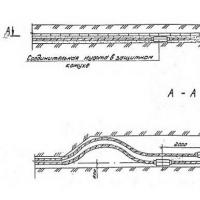 Requirements and rates for cable laying in Earth Scope of application, Definitions
Requirements and rates for cable laying in Earth Scope of application, Definitions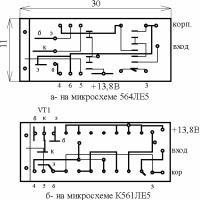 Automobile stroboscope from laser pointer
Automobile stroboscope from laser pointer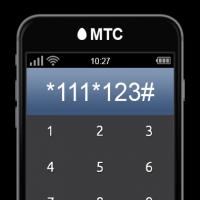 Order 20 UAH to the account. How to Borrow on MTS. Additional information on the service
Order 20 UAH to the account. How to Borrow on MTS. Additional information on the service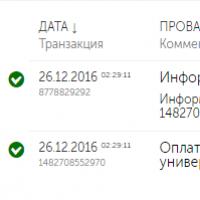 How to check the account replenishment
How to check the account replenishment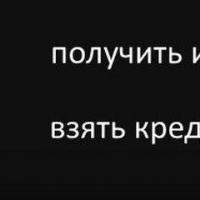 How to get a loan on tele2?
How to get a loan on tele2?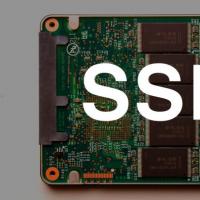 Responsiveness SSD on a miniature board What SSD Drive Buy
Responsiveness SSD on a miniature board What SSD Drive Buy